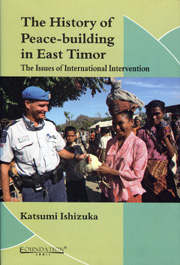Book contents
- Frontmatter
- Contents
- Preface
- Acknowledgements
- Acronyms
- Introduction
- Section 1 Historical Background
- Section 2 Policy Analysis
- Chapter III Review of the United Nations Transitional Administration in East Timor (UNTAET)
- Chapter IV UNMISET and Capacity-building in East Timor
- Chapter V A Judicial Aspect in Peace-building in East Timor: Response to Crimes against Humanity in 1999
- Chapter VI After the 2006 Crisis in East Timor: the Issue of the Exit Strategy and Capacity-building in UN Peace Operations
- Chapter VII Australia's Response to East Timor's Issues
- Section 3 Comparative Analysis
- Conclusion
- Bibliography
- Index
Chapter VI - After the 2006 Crisis in East Timor: the Issue of the Exit Strategy and Capacity-building in UN Peace Operations
from Section 2 - Policy Analysis
Published online by Cambridge University Press: 26 October 2011
- Frontmatter
- Contents
- Preface
- Acknowledgements
- Acronyms
- Introduction
- Section 1 Historical Background
- Section 2 Policy Analysis
- Chapter III Review of the United Nations Transitional Administration in East Timor (UNTAET)
- Chapter IV UNMISET and Capacity-building in East Timor
- Chapter V A Judicial Aspect in Peace-building in East Timor: Response to Crimes against Humanity in 1999
- Chapter VI After the 2006 Crisis in East Timor: the Issue of the Exit Strategy and Capacity-building in UN Peace Operations
- Chapter VII Australia's Response to East Timor's Issues
- Section 3 Comparative Analysis
- Conclusion
- Bibliography
- Index
Summary
Introduction
UN peace operations, which originated in UNTSO in 1948, have changed and expanded their scope and mandates. In An Agenda for Peace in 1992, the then UN Secretary-General, Boutros-Ghali, mentioned four types of UN operations: preventive diplomacy, peacemaking, peace-keeping and post-conflict peace-building. Among them, postconflict peace-building is a mission in which a UN mission helps a newly-born or newly-democratised state construct the nation-building process from various aspects: security, justice, governance, medicine, education, etc. A series of UN peace operations in East Timor were the typical cases for the process of peace-building. A strong economic and military commitment from the UN enabled East Timor to become independent from Indonesia in May 2002. In fact, it has been said that East Timor is a child of international society.
East Timor has been fully supported by the UN in its peace-building process. The United Nations Mission in East Timor (UNAMET: June–October 1999), which was established as a political mission, was mandated to organise and conduct a popular consultation to decide whether the East Timorese people chose a special autonomy within Indonesia or rejected the proposed autonomy, resulting in East Timor's separation from Indonesia. The United Nations Transitional Administration in East Timor (UNTAET: October 1999–May 2002), which was a multi-functional peacekeeping mission, exercised administrative authority over East Timor during the transition to independence.
Information
- Type
- Chapter
- Information
- The History of Peace-Building in East TimorThe Issues of International Intervention, pp. 146 - 165Publisher: Foundation BooksPrint publication year: 2010
